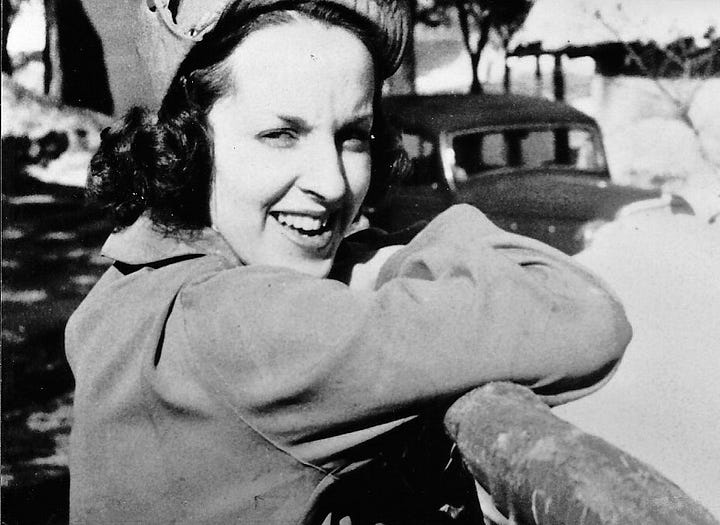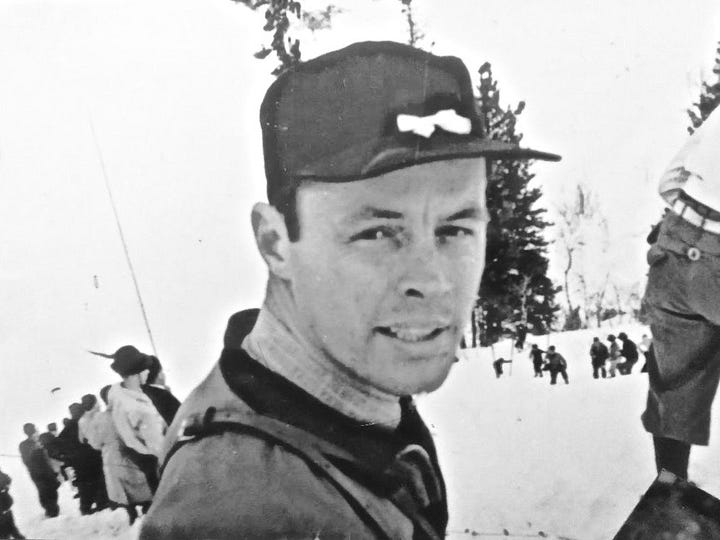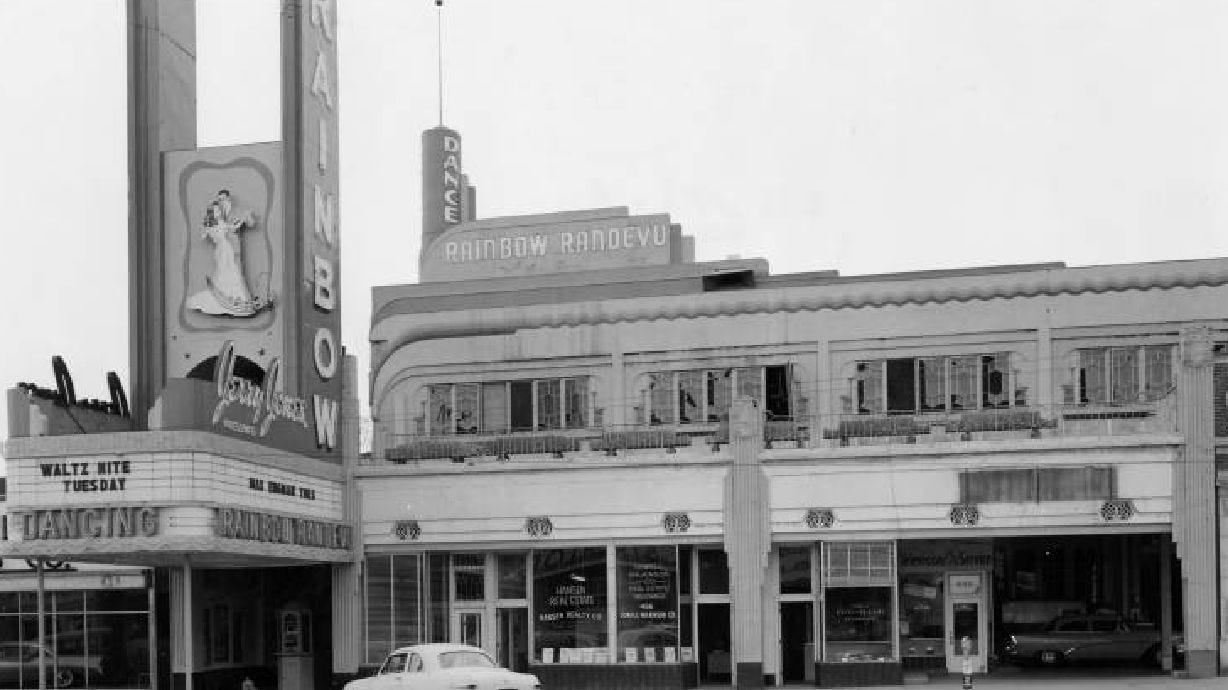
At fourteen, Lois searched for work to help her family survive the Depression. By wearing her glasses and piling her hair in a formal hairdo, she looked old enough to pass for someone over the legal age of sixteen. Each morning, she would go to the back door of the stores on Main Street. If someone didn’t show up for work that day, whoever waited at the back door subbed for the day. If they did well, they would be hired full time. This way, Lois worked in every store on Main Street. A stint in the camera department of ZCMI, however, changed her life.
One day, a young “tough” named Al, who liked to hang out and talk photography with the guys, came into the store. Because he wore tight t-shirts, Lois looked upon him as a backstreet boy, not a complimentary notion in those days. Then one day, Buford, her workmate, asked her to go skiing with a group of his friends. With great excitement, Lois told Al about it. She loved to ski. Later, Al heard Buford telling a friend on the phone that he wanted to "dump Lois and take another girl."
With this information, Al went straight to Lois and told her, “You’re going skiing tomorrow but not with Buford. You’re going with me. I’ll pick you up at eight.”
Before she could protest, he was gone. Next morning, he found her waiting on the front porch, looking puzzled and dejected. “How did you know they were going to dump me?”


Without answering her question, he loaded her skis into his Model A and off they went. The man who ran the gas station at the crossroads north of Park City, UT would load kids into his truck and take them to the top of Thanes Canyon. From there, Al would point his skis straight downward and schuss to the bottom. This madness was his attempt to beat the man down the hill to the gas station.
Other times, they crossed over the ridge and skied to the lodge at Alta. Leaving their skis on the second floor deck, they climbed through a window to get to the dining room. For fifty cents, they got chicken and dumplings, dressing or mashed potatoes and gravy, apple pie, and whatever vegetable Hattie cooked that day. Then they would trek back up the ridge and ski down to the gas station. Today, there's a well-maintained road over the pass between Alta and Park City. From the top, it's possible get a notion of what it took to side-step over that ridge make the return trip.
They skied every Saturday during that season, but when the snow melted, Lois didn’t see Al all summer. This particular summer, her sister, Bonnie, planned to marry her beau, Jack. Lois' other sisters, Erma and Verda, continued their frequent habit of handing off their date rejects to Lois. Without Al, her social life returned to its lackluster condition. What's more, she had dated Jack a few times and now watched as he chose Bonnie for his bride. Unlike Al, Jack was more educated and interesting. Though she felt a certain comfort with Al, Jack dazzled her with his outgoing personality, charm, and wit. Lois had to admit, though, that Bonnie matched Jack's sophistication much more than Lois could even muster. She was the shy sister.
The second big change in Lois' life came when the president of Zion’s National Bank appeared at her counter in ZCMI. He was so impressed with her professional demeanor; he offered her a job as his secretary. Knowing how to type and take shorthand, she stepped easily into that position. Her desk stood next to a huge first-storey window in the bank lobby.
One day, a shadow crossed her desk. Looking up, she saw Al spread-eagled in the huge window, trying to get her attention. He got it all right, though it didn’t make a good impression. Burying her face in her hands, she wondered about her prospects with this wild and impetuous man. She had to admit, though, at least he was a fun date. And she had missed him ... a lot.
Once winter came, they started skiing again. During that year of courting, they got along so well, he dared taking her dancing at the grand ballrooms where big bands traveling through town played the latest tunes. Before Lois entered his life, he was so shy, he only danced with his sisters. He felt comfortable with Lois because she wasn't full of herself as so many girls appeared to be. He could be the shy yet silly prankster his sisters tolerated so well.
Lois invited Al to a formal, bank-sponsored affair she was obligated to attend at the Hotel Utah Sky Room. Though they were dressed in the best clothes their meager finances could afford, they definitely felt out of place. After an hour of paying her dues, they slipped out early. Still in their formal attire, they retreated to a safe place to sit and talk. Al parked his car in front of the Utah Theater where they watched people coming out from the movie. This allowed them to laugh at other people from the protective shell of Al's car. It was about the only way these two socially awkward people could feel better about themselves, especially after having rubbed shoulders with Salt Lake City’s elite.
They both came from desperately poor families. Their fathers traveled the West as salesmen, coming home long enough to resupply the pantry with canned goods. Al's family had chickens and a milk cow at one time along with a garden, yet his youngest sister suffered from rickets. He often left home at dinnertime to hang out with his buddies so there would be more food for his siblings. Lois' family worked at any job they could find. They moved from house to house just before the sheriff arrived to kick them out. Lois' mother tricked the power company by inserting a coin in the electrical connector so they could keep the lights on. Hand-me-down clothes were a treasure instead of an embarrassment, benefitting from alterations on the ancient Singer treadle sewing machine.
The relationship between Al and Lois grew more serious during this year and Al asked her to marry him. Lois always figured it was proper for a girl to play hard to get, so she refused. As you can imagine, Al didn’t take this very well. Since his self-esteem was only slightly higher than hers, he never mentioned it again.
As Bonnie and Jack’s wedding drew nearer, Lois grew desperate. In as off-hand a manner as possible, she said to Al, “Remember when you asked me to marry you?”
He looked askance at her. “Well, yes, but you refused. So I won't bother you with that again.”
Their defensive tactics almost scuttled their future. Eventually, they agreed and married in the Salt Lake Temple that July. Their honeymoon started with a romantic dinner on the lawn of a Tahoe resort, then on to San Francisco, down the coast to Los Angeles and back home. During this trip, she walked down a Hollywood street and a handsome man tipped his hat to her. She thought he looked like Clark Gable or some other famous movie star. Whether this was true or an embellishment of the tale, it was one of the few bragging rights she claimed.
World War II soon caught up with them. Drafted at age 36, Al was too old for combat. They moved to Phoenix, AZ where he was stationed at Ajo in the payroll office. Lois told her daughter decades later, "those years were the happiest of our marriage. Moving back to Salt Lake was the worst decision we ever made." She later advised her daughter to live far away from family and their expectations because it would undoubtedly drive a wedge between husband and wife.
One example was the evening when Al came home from work to find Lois in tears. He knew then the sisters had come to call. "Okay, what did they say now?"
She swept her hand across the room. "It's all wrong. The furniture, the wallpaper, everything."
Tamping his anger to a slow burn, he said, "Loie, I don't care if we decide to paint the piano purple. This is our house and we will do whatever we want." Lois flung her arms around him. Her knight had slain yet another dragon.
That wasn't the only time her know-it-all sisters and mother had let their disappointment with Al be known. The in-laws became a major source of stress between them. Their two daughters lay in bed, listening to them argue deep into the night about the latest incident. What would have been their family dynamic had Lois and Al returned to Arizona, far away from family influences. Instead, they remained in S.L.C., fighting for their individuality against their families as well as religious forces that always rankled. The comfort they had found within each other's arms eventually disappeared into an unsettled marriage in an era when divorce was a last resort.
In a fit of frustration during an argument, Al blurted out, "It's bad enough I have to live with you in this life, but I'm stuck with you for eternity." Lois stood stunned. Al could be unreasonable, but she never thought he could be so cruel as to say that. Of all the things they hated about the Church, marrying in the Temple for "time and all eternity" had been the most crucial part of their faith.
Before Lois died of cancer at age sixty, she wrote letters to Al and her daughters, admonishing them to continue obedience to the Church and outlining other obligations. In her letter to Al, she took her final shot at how deeply that one remark had hurt her. As if losing the love of his life wasn't bad enough, there was no way he could avoid the guilt her letter laid upon him. He broke down and cried in front of his daughters.
For the remainder of his life, Al languished in his routine. Bowling on Mondays. Ward teaching on Wednesdays, visiting his mother on weekends, a day of bill paying in person where the clerks always greeted him by name. His job as an electrician gave him a sense of purpose until it finally ended in forced retirement when he was sixty-nine. His daughters lived nearby and visited often. He had friends and neighbors who respected him, but there was a always that hole in the air where Lois belonged. He grieved for her until the day he died.
If you enjoyed this post, feel free to explore other writings in the Ring Around the Basin Archive. I also love to read your comments, so please share your thoughts. Let’s start a conversation. And if you wish to support my writings, please consider subscribing or upgrading to a paid subscription. It’s now only $50/year. Even better, I would appreciate it if you could share Ring Around the Basin with your friends. Thank you!
All my books, Paradise Ridge, When the Horses Come and Go, and Ghost in the Forest are currently available on Kindle. Ghost in the Forest, is also available in paperback. Paradise Ridge is out-of-print, but the Kindle version is re-edited and better quality.
Book Review of Ghost in the Forest:
"Ghost in The Forest' is a great read! Take note People. If you love stories about environmentalism and nature, its clash with urban mindsets, as well as personal transformation, this is the book for you!
"Ghost in The Forest" is a quick 126-page read. It's the story of Dori, a woman trapped in a mix of grief over parental loss and refusing to accept how her hometown and her friends have changed over the years. Because of this, Dori has become a recluse and a self-imposed misanthrope who finds more comfort amongst the hiking trails around her hometown of Morristown than in her dealings with the raw reality of other humans.
The book, in some ways, resembled Edward Abbey’s “Desert Solitaire” in that the story follows a protagonist's love of nature and angst about humans encroaching on it. In this case, it’s how Morristown is transforming into a mountain biking destination where cyclists run rampant on trails and nature.
However, a tragedy involving said mountain biking becomes a major pivot point for Dori, leading to a series of events that eventually bring about personal evolution and discovery.
If you're a nature lover, this book is a must-read. It beautifully portrays the clash between environmentalism and urban mindsets and the journey of personal transformation. The book's vivid descriptions of nature and the protagonist's love for it will surely intrigue you.
Paradise Ridge Review by western author D. B. Jackson:
If you draw circle roughly around an area that includes northern Nevada, southern Oregon, and southern Idaho, within that circle exists a culture and people who live a lifestyle largely untouched by modern values. These are the "buckaroos" and Basque characters author Sue Cauhape brings to life in her literary novel, "Paradise Ridge".
Leandro, the illegitimate seventh son of patriarch Xavier Arriaga and his mistress, Gisela, is at the center of this intriguing story that travels exceedingly successfully at both the personal level of the characters, as well as the compelling level where the story is told.
Cauhape writes in a literary style that reminds me of Annie Poulx. Paradise Ridge, on the surface, appears to be an upscale Western novel...once inside the pages, you will soon discover a potential classic waiting to be discovered.
I rated this book a 5...because that's all the stars there were.









I agree with Bob. A marriage vow is to love and cherish each other, not necessarily each other's families (unless you are Italian, of course...) Al and Lois were such a lovely couple, Sue, I am so glad you are writing about them. Such a poignant ending.
So the moral of this story is once you marry move away from your family and church. Sounds right to me 😆🤣